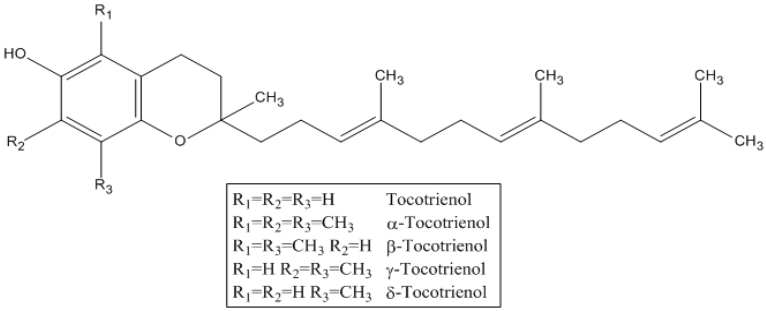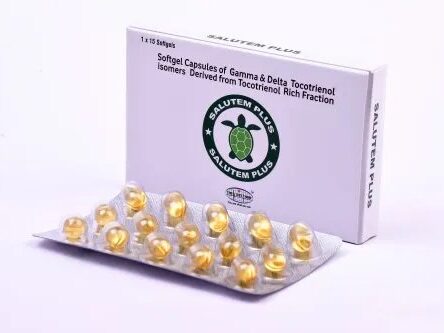Gamma And Delta Tocotrienol: A Comprehensive Guide to Its Health Benefits
Gamma and delta tocotrienol, a lesser-known member of the vitamin E family, is gaining recognition for its remarkable health benefits. This unique compound offers a range of advantages, from cardiovascular support to potential applications in cancer treatment. In this comprehensive guide, we’ll explore the world of gamma delta-tocotrienol and its importance in health and wellness.
Understanding the World of Tocotrienols
Before delving into gamma delta tocotrienol, it’s essential to differentiate between tocopherols and tocotrienols. Both belong to the vitamin E family and share structural similarities, but tocotrienols have an unsaturated side chain that sets them apart. This structural difference translates into distinct functionalities, making tocotrienols a subject of growing scientific interest.
The Lesser-Known Tocotrienols
While tocopherols have garnered more attention, tocotrienols deserve recognition for their unique health-promoting properties. Among tocotrienols, gamma-delta tocotrienol stands out as a particularly potent subgroup. These isomers exhibit exceptional bioactivity, making them a focal point of our exploration.
Defining Gamma And Delta Tocotrienol
Gamma and delta tocotrienols consist of two isomers: gamma and delta tocotrienols. These isomers have demonstrated significant potential in various health applications. To understand their importance, let’s delve into their mechanisms of action and potential benefits.
Its Importance in Health and Wellness
Gamma and delta-tocotrienol plays a vital role in promoting overall health and wellness. Its unique mechanisms of action make it particularly valuable:
Antioxidant Properties: Gamma and delta tocotrienols are potent antioxidants, helping to neutralize harmful free radicals in the body. This antioxidant capacity contributes to cell protection and supports various bodily functions.
Anti-Inflammatory Effects: Chronic inflammation is linked to numerous health issues, including cardiovascular diseases and cancer. Gamma delta tocotrienols exhibit anti-inflammatory properties, potentially reducing the risk of chronic conditions.
Potential in Disease Prevention: Emerging research suggests that gamma and delta tocotrienols may play a role in preventing diseases like cancer, neurodegenerative disorders, and cardiovascular conditions. These potential benefits make them a promising subject of scientific study.
Dietary Sources of Gamma Delta Tocotrienols
Incorporating gamma and delta tocotrienols into your diet can be achieved through natural sources and supplements:
Natural Sources: While gamma delta tocotrienols are present in certain foods, such as rice bran, barley, and palm oil, they are typically found in limited quantities. However, including these foods in your diet can provide a modest intake of these beneficial compounds.
Supplements: For a more concentrated and consistent dose of gamma delta tocotrienols, supplements are available. These supplements are formulated to ensure you receive a reliable amount of these essential compounds. Salutem plus supplements are rich with Gamma and Delta Tocotrienol.
Salutem Plus
Experience the epitome of vitality with Salutem Plus Tablets, meticulously crafted with the extraordinary potency of Gamma Delta Tocotrienol. These supplements are more than a mere supplement; they are a revolution in the realm of anti-aging and inflammation reduction. Salutem Plus emerges as a beacon of hope, especially for individuals combating insulin diabetes, offering resolute support for healthy metabolism, digestion, and elimination. Its unique composition acts as a natural antioxidant, paving the way for cellular rejuvenation.
Within its core lies the essence of Amlokoi, a vital hormone that orchestrates the seamless transportation of blood glucose into your body’s cells, fueling your energy reservoirs. Witness the magic of cellular repair and optimum nourishment, making Salutem Plus Tablets the quintessential solution for anti-aging treatment. Embrace this powerful source of antioxidants, and let your journey towards timeless vitality begin.
Health Benefits and Potential Applications
Gamma delta tocotrienols offer a wide range of health benefits and potential applications:
Cardiovascular Health: Studies suggest that gamma delta tocotrienols may contribute to improved cardiovascular health. They have shown promise in lowering cholesterol levels, reducing the risk of heart disease, and supporting overall heart function.
Cancer Prevention and Treatment: Research in the field of oncology has explored the role of gamma delta tocotrienols in cancer prevention and treatment. These compounds exhibit anti-cancer properties and may play a significant role in future cancer therapies.
Neuroprotection: Cognitive health and brain function are vital aspects of overall wellness. Gamma delta tocotrienols have shown promise in supporting brain health, potentially offering benefits in neurological disorders and cognitive decline.
Gamma Delta Tocotrienols and Skin Health
Beyond their internal health benefits, gamma delta tocotrienols also have potential applications in skincare:
Skin Anti-Aging Effects: Gamma delta tocotrienols may promote youthful skin by stimulating collagen production and improving skin elasticity. These actions can help reduce the appearance of wrinkles and fine lines.
Protection from UV Damage: The sun’s harmful UV rays can damage the skin and lead to various skin disorders. Gamma delta tocotrienols offer protection against UV damage, making them a valuable addition to skincare routines.
Beyond Health: Industrial and Cosmetic Applications
Gamma delta tocotrienols extend their influence beyond health and wellness:
Industrial Uses: These compounds find applications in manufacturing and industry, showcasing their versatility and potential benefits beyond the realm of health.
Cosmetic Industry: In the cosmetic industry, gamma delta tocotrienols are utilized in skincare and beauty products, where they contribute to enhancing skin and hair health.
Conclusion
In conclusion, gamma delta tocotrienols are a fascinating group of compounds with immense potential in promoting health and wellness. Their antioxidant and anti-inflammatory properties, along with their role in disease prevention and skincare, make them a valuable addition to a holistic approach to well-being. As ongoing research continues to uncover their benefits, exploring the exciting potential of gamma delta tocotrienols is a journey worth embarking upon.



